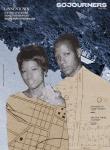THE INTERIOR CASTLE, the best-known text of 16th-century Spanish saint Teresa of Ávila, is a tour of the inward ways we relate to God, with varying intensity, awareness, and intimacy. In Spanish, the book is simply Moradas, or “Dwellings,” a title I find more appealing and helpful than the English title, mostly because “dwellings” sounds approachable, universal, and less precious.
Teresa was a grounded mystic. She is down-to-earth in her prose, her witty and candid teaching, and her lived experience. It could be argued that every “true” mystic or saint is grounded or has some element of both the active and contemplative life. Teresa strikes me as remarkably and robustly balanced, in a way that her basic reputation as a mystic sometimes betrays. She is notably resolute in both her defense of the reality of “supernatural” prayer experiences and her insistence that this loving movement of God to an individual must then extend into the world rather than curve in on itself. What we might call her grounded nature even extended into her prayer dialogues with Jesus: Once, when complaining honestly to Christ about her many struggles, she heard a response to this effect: “Don’t be troubled; so do I treat my friends.”
Her tart response? “I know, Lord — but that’s why you have so few friends!” In many of her waking days, she worried that Christ has so few “good friends,” and tried to encourage her contemporaries to become better friends of God. But she is clear-eyed and honest about the things that stand in the way of that friendship, from within and without.
‘You need a retreat’
FROM THE OUTSIDE I might not seem like someone who struggled to have a close relationship with God. I am, in the words of one of my slightly befuddled college friends who asked me to officiate at his wedding, a “real-life religious person.” But even as I filled out applications for seminaries and divinity schools, understanding in my mind how the work of ordained ministry aligned with my gifts and values, I wrestled with the vexing question of God’s love and personal care for humanity.
I prayed with integrity, trusting that in some mysterious way this was good and right and helpful, even if it was simply a matter of reorientation toward humility and justice. I could talk about following the way of Jesus with integrity — the way of forgiveness, reconciliation, truth telling, humble service, compassion — trusting it as a holy path of justice and healing. It seemed to me a path simple but not easy, full of hope for the world’s transformation if we paid heed. But I recognized, even if obscurely, something I felt I could not do with integrity: Proclaim God’s love for the world or any particular person.
One afternoon, I admitted this out loud, and received in return a piece of life-changing advice.
“I really think you need a silent retreat,” my spiritual director said.
“How long?” I asked.
“Oh,” she said plainly, “it takes at least three nights.”
The grace I sought
AND SO, EVER obedient, I set out for a small Roman Catholic retreat center on the other side of San Diego. When I arrived at the house, I met with the white-haired sister who served as my spiritual director throughout my retreat. I would check in with her once each day; otherwise, my time would be spent in silence and solitude. She provided some basic suggestions for my times of prayer, affirming that “seeking understanding” is my faith, but also noticing that I yearned for something more. “This is what you will be trying to do,” she said: “Come to know the heart of God through the word of God. Listen! As you pray these verses, just be noticing, not analyzing.” She spoke in direct terms about the kind of prayer that is honest and personal. “What is the grace that you seek?” she asked. “Be very clear about this. What are you looking for? What grace are you asking of God?”
She urged me to pray various scriptures throughout the day, listening, paying attention, and at the end of the day, reflecting on how grace has been given. “In the midst of it all,” she said, “trust that God is at work!”
It’s like she saw right through my big talk about God. Because she was talking about trust in a personal way, like there might be some point to “paying attention” beyond obedience and discipline — and that’s the kind of trust I didn’t have. I realized that in my first period of prayer and reflection, right after I met with her, as I considered her question about what I’m looking for. I realized that my honest fear was not that God doesn’t exist, but that it is impossible to know God, that God is inaccessible. That God is at work, but not in any way that we can ever know. The grace that I sought was to know that the God of the universe is somehow accessible, that I might somehow hear or know of God’s work in my life and the lives of others, even in small part.
The Fourth Dwelling
WHAT HAPPENED OVER the course of the next four days transformed my understanding of God and began a new chapter of faith. Teresa describes the fourth dwelling place as the stage where the natural and supernatural experiences of prayer meet; in symbolic terms, the demanding work of carrying water is interrupted by the feeling of a spring welling up inside. On the second morning of the retreat came a moment where I saw the “messiness” of that fourth dwelling place, where acquisitive seeking and passive receiving comingle.
Around 11:30 in the morning, I sat in my retreat room’s recliner to pray, holding a single sheet of paper with Psalm 139 printed on it. I read it all the way through, staying in my head. But I thought back to the instruction to ask for the specific grace I’m seeking, and the invitation to wait, trusting that God would come into the space I managed to clear. I asked for the Spirit to help me pray, too, ever more aware of my need. Then, I started to meditate prayerfully upon these lines: “You have searched me out and known me,” repeating them slowly over and over. This repetition soon morphed into the real and deepest question of my heart: Have you searched me? Have you known me?
As I asked, almost accusingly but also very truthfully, with trust that God would answer in some way, my body began to feel warm: My legs were shaking, and a trembling seized me, drawing my attention to warmth and internal movement through my feet. It felt like God was saying, “All the way through the blood in your feet, to the tips of your toes I’ve known you; every part.” I was shocked and moved into a new prayer in response: “You have searched me; you have known me,” but even yet this didn’t seem right, and I kept trembling when I said “known.” I realized through a sense of pressure, correction, that this needed to be in the present tense; it needed to be “know”: “You have searched me, and you know me.” I kept praying this way, caught up in both fear and awe at what was happening.
I am loathe to describe the specific physical elements of my experience because such descriptions invite skeptical analysis, as they certainly have for Teresa. It is obvious she tries to minimize these aspects, too, though in the end they are present; they are part of her work. And, tellingly, they are the parts of her work that people who have never read her know something about: “Didn’t she levitate? Didn’t she feel pierced with fiery arrows?” This is the “crazy-mystical” stuff that both attracts and repels attention, in a way that sometimes has little to do with genuine interest in the movement of God. I offer more details for the sake of those who do care.
Presence, fear, and awe
WHAT I HAVE written thus far doesn’t do justice to the sense of power and otherness that moved my body in fear and trembling. It was frightening in its newness and unexpectedness, the way it ruptured my understanding of how God would or would not be present on this earth in these times, to insignificant individual humans, and more particularly a cold-blooded white girl like me, formed by the staid spiritual expectations of the “frozen chosen.” My full journal entry after the fact includes the words fear, scared, frightening, scary, and freaked-out, along with the admittedly “silly” observation that “I’m not Pentecostal, but this is still happening to me.”
This. The overall physical effect might be compared to a mild seizure that just kept shaking me again and again as I prayed, drawing tears, and yet leaving me with full presence of mind, the capacity for observation and bewildered engagement in this foreign conversation, but also the (real and terrifying) awareness of another power affecting my physical being. As I moved further into this prayer of “You know me,” eventually the fear and awe overtook me and transformed my words to “Holy God.” Later, as the experience intensified, even this gave way to a simpler prayer: “I’m scared.”
In my fear I turned to Jesus: the name of Jesus, the idea of Jesus, the Jesus to whom I had never prayed for help more urgently or earnestly. I don’t know why I thought Jesus might help me, except that I figured if anyone knows what it’s like to be seized by the Spirit of God, it’s him. My prayer was like that of Jesus’ friends who think they might die in the storm, and so I begged him for relief. Suddenly I grasped — and pinned my hope to — the notion of Jesus as the Christ, the priestly mediator, the one who can stand between small creatures and their Creator, the one who cannot just bridge this cosmic divide but provide a sheltering wing for the frail human psyche.
This thought came later, of course; in the moment I just cried out to Jesus because he was a human and divine figure I trust, despite all my intellectual qualms. There seemed to be no other place to turn when I wanted out of the boat. Slowly, gently, there was relief. Calm settled over my limbs and my heart. I lay there in stillness for a moment, then uttered an exhausted prayer of thanks. Despite the fear, the confusion, I was awake enough to say thank you to God for this gift, this sign that I am known, every particle of me. I opened my eyes and looked across the room at the alarm clock next to the bed; about 30 standard minutes had passed in this time when I felt outside of time.
I stood up, bewildered. As I wandered toward the bathroom, I wondered: Did I just conjure that whole thing? Did I somehow make that happen? I was washing my hands with the light off, and I began to doubt that it was God after all. Suddenly the Spirit seized me again, my knees buckling beneath me. I made my way back to the chair, where I prayed and put my head down in my lap, again asking for Jesus to be with me. I cried, overwhelmed by God’s insistence that I not toss this great gift aside. I cried, seeing clearly that I always thought I wanted a mystical experience of God, but I should have been smart enough to fear it a little more. It felt like I had been given the very slap in the face that I had been praying for, and I was embarrassingly surprised.
You dare to ask if I know you? If I have searched you? I am in every part of you! Moving in you even as you don’t understand what is happening, knowing your very thoughts before they are on your lips.
I don’t know where to go from here, other than to the place that the line from the psalm leads me, where I can rest in wonder, at least for a bit: I am known. It is what I can say with every part of me, even as my mind continues its habits of protest: I am known.
This excerpt is adapted from An Intimate Good: A Skeptical Christian Mystic in Conversation with Teresa of Ávila (Whitaker House, 2024). Used with permission.

Got something to say about what you're reading? We value your feedback!







